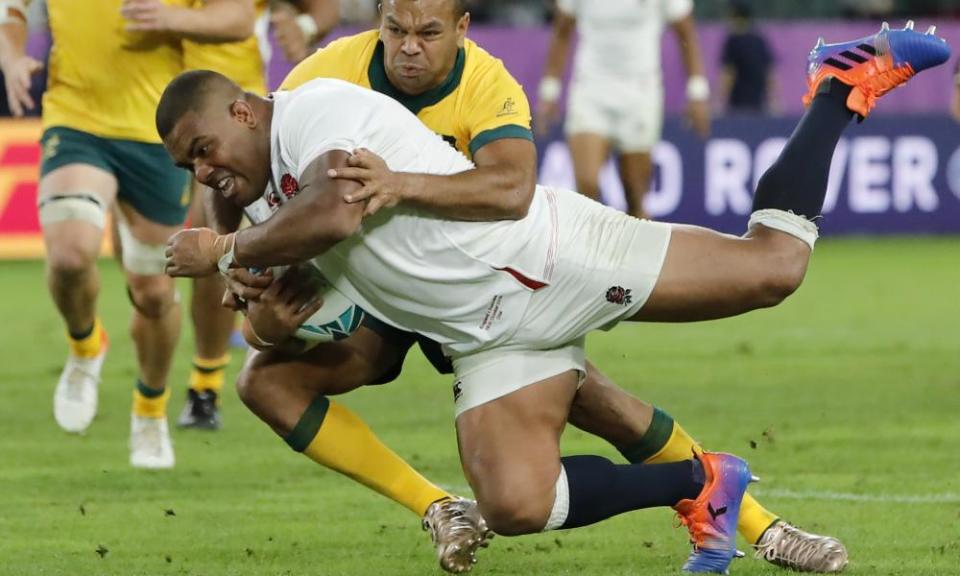Kyle Sinckler highlights the need for transfer fees for homegrown players

It is that time of the year when speculation starts to swirl over players’ futures. If anyone is going to move from one Premiership club to the next, officially they cannot be approached until January, but inevitably wheels are set in motion and Kyle Sinckler is the player who has got everyone talking at the moment.
Sinckler’s situation raises two important questions: is it worth having an England international on a premium contract in your squad and are clubs compensated well enough for doing so? The first question is open to debate; the answer to the second is a resounding no, not least when it gets to the stage that the club – in Sinckler’s case, Harlequins – can seemingly no longer afford them. As a solution, or at least part of one, I would propose transfer fees for homegrown players.
Related: Saracens salary-cap breach stamps an asterisk on a great club and the game | Robert Kitson
This has been a problem brewing for a number of years but it is sharply in focus, in part because of the time of the year, in part because England internationals’ profiles have never been higher so soon after the World Cup, and in part because of the Saracens salary cap scandal. Two years ago, Mark McCall, the Saracens director of rugby, said his club were not being rewarded well enough for developing players such as Owen Farrell, Jamie George and George Kruis. Saracens are now £5.4m and 35 points worse off for breaching the salary cap.
Leicester find themselves in a similar position now in the sense that they have a number of their England internationals out of contract at the end of the season and something is going to have to give. Northampton are being lauded for the way they have put their trust in young players such as George Furbank and Lewis Ludlam but inevitably they will encounter similar problems down the line. It is why it is so crucial that clubs adhere to the salary cap because they will not be performing the same juggling act that others have to and can just poach the best players from the Premiership.
Premiership clubs receive about £80,000 per England player and in that sense McCall did have a point because that is not enough of a reward for developing homegrown talent who go on to miss huge chunks of the season due to international commitments. And players are coming through even younger. We have 18-year‑olds involved in England’s elite player squad – that is a credit to the academies but if they go on to play 10 international matches a year, the clubs are being short-changed.
Related: Saracens judgment is a spectacle of a sport robustly applying its rules | David Conn
Then you have the problem of wage inflation. Sticking at Harlequins, take Alex Dombrandt as an example. He has burst on to the scene and is due for a contract renewal that will be a significant rise for him, yet still affordable for his club. If his trajectory continues as it is, however, will Harlequins be able to afford him in a couple of years when he is due another contract? If they can’t they will lose him for nothing. The counter-argument is that maybe the player should stay out of loyalty but when careers are getting shorter, who can blame a player for wanting to maximise his earning power and be paid the going rate?
You could have a player who has been part of your academy for up to 10 years and suddenly you’re not able to afford him and off he goes. Where is the reward for all the good work you’ve done? If you’re a homegrown player and the club have developed you to the point that they can no longer afford you, it doesn’t feel right. There needs to be more support and more compensation for the efforts the club has put into the player.
I stress that the introduction of transfer fees would apply to homegrown players only and the point would be to benefit primarily those top-six clubs who are producing multiple England internationals and not being rewarded in kind. I think of clubs such as Sale and London Irish, who in recent years have been ransacked in terms of players they have developed.
It is not just losing what those players bring on the pitch. It has an effect on the club commercially and the appeal of their academy for youngsters. Sinckler is a shining light for Harlequins because he has been with the club since he was 12 and developed into a world-class player, someone who can do things that very few other tightheads in the world can do. He’s the poster boy for any budding Harlequin but it is becoming increasingly difficult to house multiple current internationals in one squad and to be competitive. If you have teams not adhering to the salary cap then it becomes impossible.

 Yahoo Sport
Yahoo Sport 





































